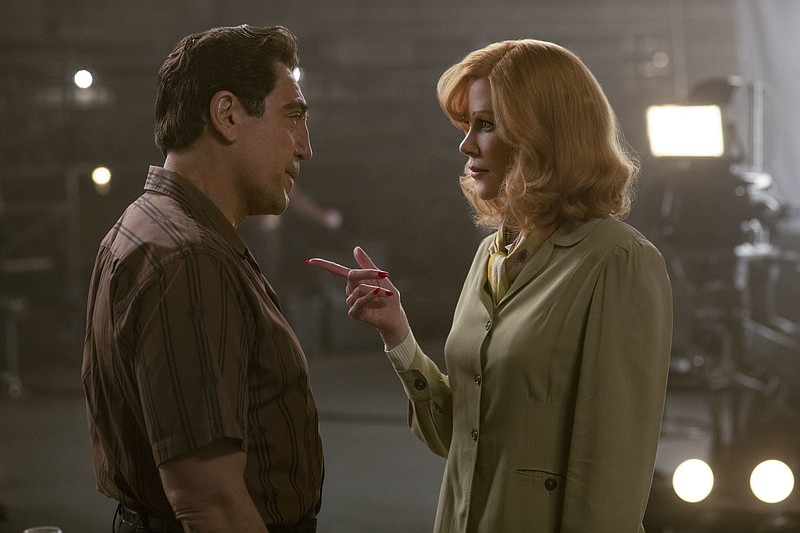If there's been one overriding trope throughout the various works of Aaron Sorkin -- and there are a great deal more in play; he's a writer who's constantly in thrall to his particular hobgoblins -- it's the Savant at Work. Be they presidents, newscasters, computer programmers, or, in the case of this film, TV comedians, Sorkin is quick to deify his bevy of workplace wunderkins, spotlighting their otherworldly ability to do what they do amid a steady stream of seemingly insurmountable obstacles, and against waves of far less talented management types trying to ground their angelic genius.
For this production, Sorkin has swung his starshine toward Lucille Ball (played by Nicole Kidman), and, to a lesser degree, her talented once-husband, Desi Arnaz (Javier Bardem), as the pair prepare an episode during the second season of their '50s-era, mega-hit series, "I Love Lucy" for a TV audience of better than 60 million viewers.
This particular week in 1953, however, there are more than a few storm clouds brewing over the Arnazes: For one thing, Desi, who's been spending more and more time away from the home he shares with his wife and baby, shows up on a tabloid with another woman in tow, a charge he steadfastly denies to Lucy; for another, she's just been called out on a popular national radio show as being a communist, a charge, in the time of the House Un-American Activities Committee, that could well serve as a career obliterator, if proved true.
Sorkin being Sorkin, the film is laid out in daily segments, from Monday's read-through, to Friday's live taping, with various points of backstory -- including the couple's first meeting, Lucy's big breakthrough, and her shift from film to radio to TV, a medium that finally offered her a chance at true stardom -- highlighted as addendum material.
Sorkin, himself a veteran TV showrunner, has a great deal of fun on the smoky set of the legendary show, with the actors playing the Ricardos' TV-best friends Fred and Ethel Mertz (J.K. Simmons and Nina Arianda) bickering like the couple they portray on the show, and the backstage writers' room teeming with the wounded ego of showrunner Jess Oppenheimer (Tony Hale), the passive aggressiveness of writer Bob Carroll (Jake Lacy), and the endless oneuppersonship from fellow writer Madelyn Pugh (Alia Shawkat).
There are, of course, the clueless executives, headed by CBS stooge Howards Wenke (Clark Gregg), and Phillip-Morris bubba chunk Roger Otter (Jeff Holman), who positively freak out when Desi informs them of Lucy's pregnancy, and his desire for the show to portray her pregnancy on-air, building up to the actual birth of their second child.
But the film belongs to Lucy, the fiery redhead who picked herself off the mat again and again early in her career, before finally finding her true calling as America's favorite ditsy housewife. Sorkin turns her flair for intricate physical comedy into her superpower, as we're treated with her vision of scripted scenes in black-and-white, as she imagines them in her head. One sequence, in particular, which involves the feuding Mertzes being stuck together on a too small bench at the Ricardos' dinner table, plays over and over in her mind as she considers each possible combination of comic shenanigans until she at last arrives at the blend she believes best maximizes the funny.
As you can imagine for such a project, with iconic actors being portrayed by other thespians, casting becomes of paramount importance, and on that front, Sorkin's film is a decidedly mixed bag. On the good side of the ledger is Kidman (playing her second TV comic icon, after trying her hand at Elizabeth Montgomery in 2005's "Bewitched"), who somehow manages to re-create Ball's signature nasal-tinged rasp almost note for note, screwing up her face to complete the comic effect. Likewise, Simmons and Arianda, both uncannily resembling the actors they're portraying, and adding nuance and dimension to the pair beyond their set-in stage chops.
On the other hand, however, we have Bardem. As talented as he is, and as much as he works to nail Arnaz's signature, consonant-heavy, Cuban accented English, there is no way the hulking, broad-shouldered actor can re-create Arnaz's compact irascibility, the perfect foil to his wife's bubbling ball of energy. His physical helplessness against her onslaught was the key to the couple's comic identity, but Bardem, try as he may, simply looms too large and manifest to represent Arnaz's physical docility.
Also, Sorkin's methodology, here compressing several super significant events together as if everything happened in a few days' time, gives the narrative a cloying, heavy handedness. Even a film designed to be such a clear production in and of itself -- replete with talking head re-creations of executives many years later recounting their time working on the show -- Sorkin's instinct for making everything feel like an equally overproduced show gives the domestic scenes the same kind of glib bombast as the actual scripted series, which lessens the tensions considerably, much as Sorkin wants it to carry through into something deeper.
The film isn't intended as a tell-all (about the only insight we are given as to the nature of their relationship comes from one of the talking heads, who describes the couple as either "tearing each other's heads off, or tearing each other's clothes off"), but with such a shallow portrayal, and Sorkin's undying love of workplace procedure over character depth, you don't really feel any closer to Lucy as an actual physical person, rather than a deified comic impresario, than when you started. There are worse things than watching Kidman channel one of the more gifted physical comics of the 20th century, but there's also a definite sense of lost opportunity in the mix.
